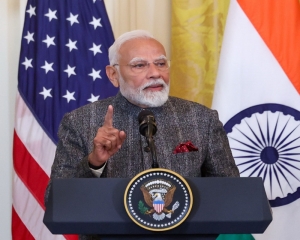At the heart of the Mahakumbh lies a unique tradition of selfless service-community kitchens, or bhandaras, feeding millions of pilgrims daily. These kitchens, run by religious organizations, ashrams, and private groups, ensure no visitor goes hungry, offering everything from tea at dawn to wholesome meals at night-all free of cost.
The hospitality is unmatched. Volunteers lovingly invite passersby to sit and eat, creating an atmosphere of camaraderie and devotion. In every corner of Kumbh City, at least one bhandara is always open, ensuring constant access to food.
“I came here with just enough money for travel, but these kitchens made sure I did not have to worry about food,” said Gopal Das, a pilgrim from Madhya Pradesh.
“The meals are simple but so tasty, and the love with which they’re served makes it even more special.”
Organizations like Anand Bhawan Seva Samiti from Gujarat serve up to 10,000 people on regular days and over 15,000 on special occasions like the Amrit Snan.
“Feeding pilgrims is part of our devotion. It feels like we are serving God Himself through them,” said Rajendra Thakur, a volunteer with the Samiti.
The meals, which typically include lentils, rice, vegetables, and khichdi, are prepared in spotless kitchens where hygiene is paramount. “We ensure all ingredients are stored securely, and even the dough is kneaded by machines to maintain cleanliness,” added Thakur.
For many pilgrims, these meals are more than sustenance-they are a moment of joy and gratitude. “I never imagined eating sweets like barfi and jalebi at a free kitchen,” said Rukmini Devi, a first-time visitor from Bihar. “It is like a blessing.”
To ensure environmental responsibility, many kitchens use disposable plates made from biodegradable materials like leaves, while others rely on reusable steel or plastic plates. At large kitchens like Anand Bhawan, diners themselves wash their plates as a gesture of devotion. “It feels like being part of a family,” said Prakash Mishra, a pilgrim from Uttar Pradesh.


























